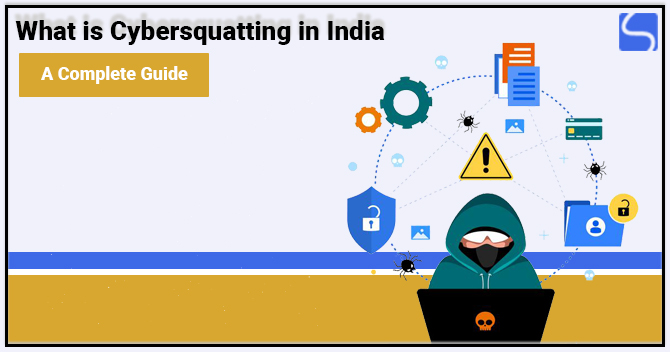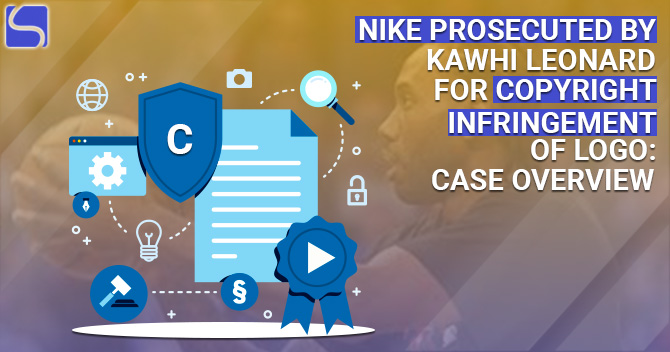What is Cybersquatting in India? : A Complete Guide

Karan Singh | Updated: Mar 28, 2021 | Category: Copyright
In the last few years, Cybersquatting has been rapidly increased and has devastating effects on the owners of the Intellectual Property Rights (IPR). Cybersquatting states to the use, sale, or registration of an existing and well-known domain name and re-selling the same to the legal owner at a profit. We all are attentive that in modern times the online presence of business houses has become necessary. So, almost every organisation in India has its domain name. At current, there is no such active cyber law that deals with Cybersquatting in India. In this blog, we are going to discuss about Cybersquatting in India.
Table of Contents
Let’s Understand Cybersquatting in India
It a violation related to the registration of a company’s website domain name that doesn’t have an integral right or matching Trademark Registration to support it, with an exclusive goal to sell them to the customer so as to obtain illegal advantages.
Cybersquatting in India can be of different categories; one of the famous Cybersquatting that is most observed is Typosquatting when a cyber-squatter registers domain names of a website comprising a variety of well-known trademarks. Typo-squatters depends on how internet users will make typographical errors when entering the domain names of the website into their internet browsers.
Also, the cyber-squatters dependon the way that owners of the Trademark repeatedly forget to register their domain names again, since the registration of domain names is for a fixed period and if the owner doesn’t register the website domain again before the expiration, then the domain name can be bought by someone else. Squatters will catch up with a domain name as it becomes available. This process is called Renewal Snatching.
The victims of Cybersquatting in India have some alternatives to face the cybersquatting threat. These alternatives consist: sending a Cease and Desist Letter to the cyber squatter, taking an adjudication proceeding under the Internet Corporation of Assigned Names & Numbersviews, or getting litigation in State or Central Court. The victim of Cybersquatting elects to utilise that an individual should not banish the severe impacts that Cybersquatting may have if left unimpeded.
Under the Indian Legal System, there is no facility in the present InformationTechnology Act in India to punish cyber-squatters; the best part is the domain name of the website can be taken back. Hence, there is no legal compensation under the IT Act; the registry of .in has found a method to permit pay to victim organisations or entities to stop cyber-squatters from further thieving domains. Most of the cyber-squatters anyway work under the excuse of suspicious names.
At current, as there is no regulation for arguments regarding domain names or Cybersquatting in India. Hence, the Trademarks Act plays an essential role in the outcomes of the court. The Trademark Act is applied to make sure that the usage of marks which categorised the trade and can vividly separate between minimum one or more trade of similar kind. It is vital to remember that the Cybersquatting cases are chosen through the guidelines of infringement or violation.
Also, Read: What is Copyright Violation and How Can You Avoid It?
Types of Cybersquatting in India
There are different methods in which Cybersquatting may be accomplished. But, the most common type is Typosquatting, which is done by manipulating the word creation of the website’s domain name. By this method, when the users make typing mistakes or errors, they are redirected to the fake or illegal website by the cyber-squatter. Following are some examples of Typosquatting:
- Eliminating the “dot” from the domain name. For example, wwwfacebook.com.
- Misspelled the website name such as www.facbook.com.
- Website’s domain name expressed in a different way, such as facebook.org.
Renewal Snatching
Cybersquatting may happen in the form of Renewal Snatching, which is an exercise of registration of a particular domain name of a website when the original owner of the website fails to renew the domain name registration. Since the domain names registration lasts for some period, the owner is required to obtain the same renewed upon the expiry of the registration. The domain name can be bought by someone if it is not registered before expiry. The cyber-squatters can buy a domain name upon the expiry of its registration, and then they re-sell the domain name to the actual owner at a higher price.
Aids available to victims of Cybersquatting in India
There is no cyber law in India that solve this Cybersquatting problem. But, the Indian Courts have dealt with these cases under the Trademarks Act, 1991. In this case, there are two kinds of aids available for the victims:
- The Remedy of Violation: This comprises criminal remedies (like the imprisonment of the suspect), civil remedies (like account profit and ruling damages), and managerial remedies (like the ban on import of invading copies). This type of remedy is available under the Trademark Act only if the domain name of the website has been registered by the actual owner under this Act.
- The Remedy of Passing-Off: This remedy consists of the application of injunction by the actual owner for the avoidance of usage of the domain name by other company or individual. If the aggrieved wants this remedy, no prior registration is required for a domain name.
Necessity for Strict Cyber Laws in India
Currently, in India, there is an urgent requirement of strict cyber Laws since e-commerce has become the need for every business. With rapidly increasing online business activities, the probabilities of cyber-crime have also increasingly diverse. A well-defined and strict cyber law that solves all the problems of the original owners of domain names is required.
The law should easy for the upset party to obtain reimbursements for the harms that are suffered due to the domain name registration in bad devotion. The provisions regarding the punishment of the online culprits should be included so that cyber-crimes can be reduced.
Conclusion
The Trade Marks Act, 1999, doesn’t have a description for Cybersquatting in India. In India, it has been observed that peoples register their domain names comprises marks or other’s Trademark since they understand that the consequences are not precisely severe. That’s why there is a need for severing cyber laws in this area to penalise the cyber-squatters and avoid these infringements in the future.
Also, Read: What are the Types of Intellectual Property Rights?













